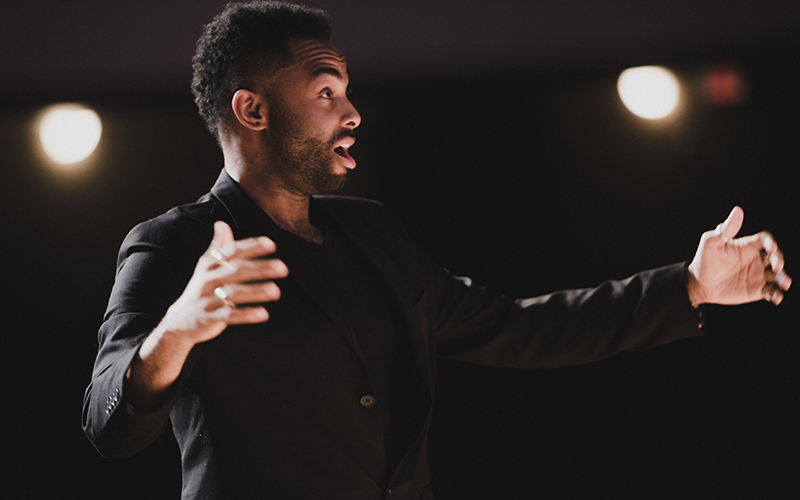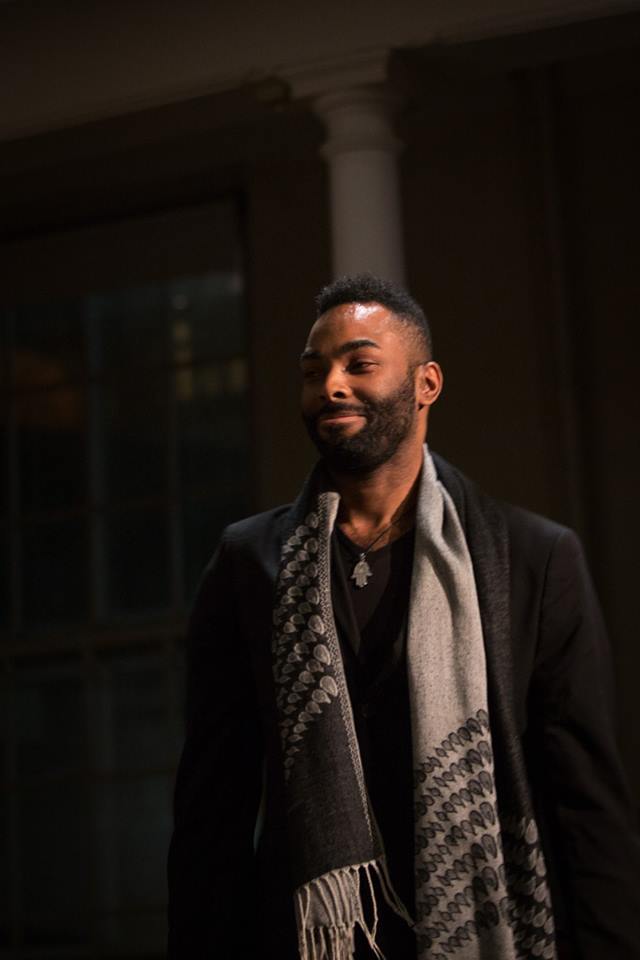
Collin Edouard's masters in music aims to open up the music curriculum and make it more representative of traditions around the world.
I want to break the hidden curriculum in music and music education that suggests western art forms are the most important forms of music we can teach.
Collin Edouard
Collin Edouard wants to change music education and make it more inclusive, to challenge the received idea that western classical music is the highest form of music and that other cultural forms are somehow of lesser value.
Collin [2019], who begins a Masters in Music [MMus] in the autumn, has recently returned from Kampala where he was teaching music. He asked his students what their favourite music was and why. When they said it was Classical music, he challenged them to question why they saw that as the most “pleasing to the ears” and “orderly” form of music and why they didn't see their own music that way. He got them to play traditional Ugandan instruments hanging on the wall to show that Ugandan music was also “orderly” and “pleasing to the ears".
“If in a predominantly black country they think their own music traditions are not worthy we, as music educators, are failing to do our jobs. When you think your own music is not good enough you think you are not good enough because music is tied to our cultural identity,” says Collin. “Classical music is beautiful, but so are other genres of music. Classical music is important, but so is music outside the Western Art canon.”
In Uganda, Collin started a campaign called, “The Kampala Music Project” to help music students with their tuition fees and to pay for musical instruments. He raised over 8.6m Ugandan Shillings. The money was donated to Kampala Music School and Mengo Senior School.
A rich Caribbean culture
Music was very important to Collin as he grew up. Though he was born in Brooklyn, New York, he was raised in a Caribbean culture – his mother is from Haiti and his father from Jamaica – and developed a love for the music which played a part in the liberation of the people in Haiti. His mother split up from his father when he was a baby and Collin grew up with her and his three sisters.
It was at his first elementary school in California, a private school that his mother was keen for him to go to so he could get a good education, that, as the only black student, he had his first experience of intense racism. “It gave me very important foundations for being strong in the face of adversity,” he says. “I was called every single name associated with my skin colour. It happened every day. I quickly understood that people use fear to bully other people and that it was their problem not mine.”
When the family moved to Florida they were told that Collin, then aged 14, would have to be put in a school considered the “white school” as part of a policy to desegregate high schools between cities. Often the only black student in his honours classes, he suffered the same kind of racism in high school as he had in California.
Collin had already taken to music, having started to learn the clarinet before high school, but his mother said she could no longer afford payments on the instrument. She told Collin to join the choir for a year until she had more money. Collin reluctantly agreed as he thought it would only be temporary. “I found out very quickly that I loved singing,” he says.
He couldn’t afford lessons so he learned to sing by copying the technique of the singers he admired, such as Andrea Bocelli and Luciano Pavarotti. He realised that singing was for him when he enrolled in a solo and ensemble singing competition where he had to sing one piece in English and one in a foreign language. “I don’t know why I entered the competition,” he says. “I could barely read music and had to ask a friend where middle C was. I spent hours at the piano during school hours trying to figure out where the notes were,” he says. He received a perfect score. “I realised this is what I should be doing, what I needed to do. It felt right. I felt as if I was at home, that no-one could tell me that I did not belong,” he states.
After that he entered the competition every year for both solo and ensemble work. He also sang at the Disney Candlelight Processional, show choirs and as many singing ensembles as possible.
It was at school that Collin realised that, although he loved classical music and considered himself a classical musician his culture was never represented in the classical canon. “It really started to chip away at my soul,” he says. “This music was taught as ‘real music’; we were told you are not a real musician if you don’t study this type of music. It starts to affect you personally because you are not represented.”
Finding a mentor
When he left high school, Collin opted to go to his local Seminole State College of Florida to do a music major. He worked his way through college and later transferred to The City College of New York. He didn’t feel confident enough at the time to challenge the music curriculum. When he was looking at colleges to transfer to he spoke to the chair of the music department at City College and was advised to speak to the head of choral activities. “His name was Ira Spaulding. I thought he would be another white teacher so I dragged my feet to his office. To my astonishment he was a black man. He was a Caribbean vocalist like me. I was overwhelmed. This was everything I needed. He took me under his wing,” says Collin.
Spaulding was the first black teacher Collin had been taught by and he spent the next two and a half years learning from him and observing him. Through him Collin developed a love of choral conducting. Spaulding also supported Collin’s desire to set up his own ensemble. While doing his studies, Collin joined a respected ensemble outside school called the Canticum Novum in order to build his repertoire and develop his ideas for his own ensemble.
Gradually as his studies continued he began to understand frustrations he had never voiced before about not being represented in the music he was studying. The examples used in music classes tended to be singers like Bob Dylan who Collin had never heard of at the time or The Beatles whose songs were vaguely familiar from soundtracks of movies and television shows he had watched.
“It puts whole groups of people at a disadvantage if the curriculum is not diverse and inclusive enough, if it is too Eurocentric and doesn’t value or take seriously all that music offers,” he says. “The role of a teacher is to educate the entire student body. Teachers need to go the extra mile and create a more inclusive environment.”
After completing his first degree, Collin moved to Galicia in Spain to teach English so he could get some international experience. There he started a choir at the school where he was working and auditioned for several choirs in Galicia which allowed him to perform around Spain and Portugal.
Back to basics
When he returned to the US to do a masters in music and music education at Teachers College at Columbia University he realised, however, that he had been perpetuating the very type of Eurocentric approach to music that he wanted to challenge, teaching his students with “the toxic elitist mindset of a conservatoire” “because that is what I had been taught”. He decided to go back to basics, to unpick the mindset that put western classical music on such a pedestal and to embrace the music of other cultures.
He was also keen to challenge stereotypes around “black” music. Collin was teaching children aged eight to 18 alongside his studies and recalls several eight year olds asking him if he could teach them rap. “I sat them down and told him that black plus musician does not equal rap artist, that I was a classical vocalist and that black people can do many things. From then on the students never asked that question again,” he says.
He started teaching music from the Caribbean. “I truly believe that if you want a glimpse into someone else’s culture the best way is through music. We get so much from folk and traditional music,” he says.
Cambridge
When he was studying, Collin had come across a Youtube clip of King’s College choir conducted by Stephen Cleobury who was Director of Music at the college. “I thought the singing was so beautiful,” he said. He recalled that music when he considered extending his studies in choral music and applied to do his master’s at Cambridge with the help of a Gates Cambridge Scholarship.
Before he arrives in Cambridge this autumn Collin is travelling to Turkey to work with Syrian refugees. He says just by doing choral music he hopes he can make a difference. “It does get tiring being the only black person in a choir or on stage, but maybe there is someone black in the audience. That person will see that it can be for them too, that they can also do this,” he says.
For his MMus he wants “to bridge the chasm between what we understand as musically relevant and what we see as secondary". He says: "As music is part of how we identify ourselves, it can be traumatic to spend your entire educational career feeling like a less competent outsider.” He adds: “I want to break the hidden curriculum in music and music education that suggests western art forms are the most important forms of music we can teach. That is my ultimate goal.”
Picture credit: Dan Wright.

Collin Edouard
- Alumni
- United States
- 2019 MMus Music
- Wolfson College
As a first generation born American, I have always been between two cultures. Music is a large part of my cultural identity and I have always been proud of being a Caribbean man, however, music in the mainstream will often make people like me feel less American which can create a shameful attitude towards our own culture. My passion for choral music is greater than simply singing in an ensemble because when we explore music from other cultures and sing their songs after learning about the song's history, we can get a glimpse into a culture that is not our own. When we have performances highlighting Traditional Folk music from various countries and Classical music on the same stage we begin to bridge the chasm of the hidden curriculum perpetuated by many of our music educators. Each voice in a chorus has an important role and each person's identity and experiences add to the importance of music making. I want to help acknowledge composers, musicians, and lyricists who might not have had their work circulated through the mainstream as often and use those voices to break down those walls of prejudice in music education. I am humbled to join the Gates Scholar community and I look forward to collaborating with my colleagues.
Previous Education
Teachers College, Columbia University M.A in Music and Music Education 2018
City University of New York B.F.A Music/Concentration Classical Voice (Summa Cum Laude) 2016
Seminole State College of Florida Associate of Arts 2010












